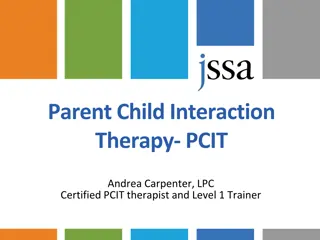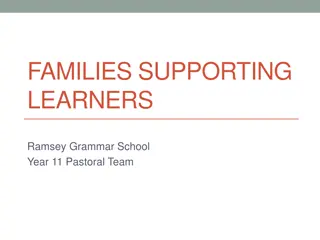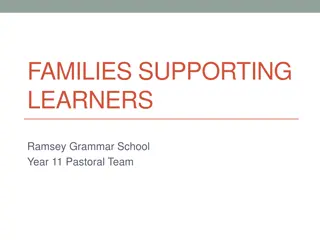Parent Night & Pre-AP: Helping Your Child Succeed
The benefits of Pre-AP courses and how to support your child's academic journey. Understand the commitment required, time management, and transitioning from on-level classes. Learn about teacher insights, adjusting study habits, and readiness indicators like STAAR scores.
Uploaded on Mar 04, 2025 | 0 Views
Download Presentation

Please find below an Image/Link to download the presentation.
The content on the website is provided AS IS for your information and personal use only. It may not be sold, licensed, or shared on other websites without obtaining consent from the author.If you encounter any issues during the download, it is possible that the publisher has removed the file from their server.
You are allowed to download the files provided on this website for personal or commercial use, subject to the condition that they are used lawfully. All files are the property of their respective owners.
The content on the website is provided AS IS for your information and personal use only. It may not be sold, licensed, or shared on other websites without obtaining consent from the author.
E N D
Presentation Transcript
Parent Night Pre AP and High School Credit
Pre AP course work in Middle School Open to all students TEKS are the same (except for Math)
Student must buy in to the idea that they are going to have to commit to working harder and longer. They have to want it. They may need to take advantage of tutorials or create a study group in order to master the material.
Taking a Pre AP class takes more time than an on-level class. There is generally more work that is done outside of class. Consider your child s whole schedule of school and outside activities and be thoughtful about adding more. Kids need time to relax and play in an unstructured way.
Teachers may spend less time on each concept in class, so students may need to review and reinforce those concepts at home, or in tutorials.
Talk to your childs current teacher and ask what they think. Most of our teachers teach both Pre AP and on-level classes and can give you some good information about your child s current skill set and level of motivation.
If you are doing well in an on-level class (85 or higher) you might want to consider moving to the Pre AP class in the subject next year. Most students can expect an initial drop in grades about 5 points until they get used to the Pre AP class. Many students find that after they make adjustments to their learning habits, their grades bounce back.
Strong scores on the STAAR test can be an indicator that students are ready for the challenge of a Pre AP class.
The intent of Pre AP is to lead to AP (Advanced Placement) classes in high school. The AP test offers students the potential to earn College Credit while still in high school.
Departmental Expectations History Pre-AP/GT students should be self-motivated and eager to learn. In social studies, our Pre-AP classes move at a faster pace. We often flip the classroom in order to learn more deeply about a topic or unit (notes and information at home activities and higher-order thinking at school). Basically we cover the same curriculum, but we cover it more deeply with more real-world projects and experiences. More group work in addition to individual work. These students need to be able to think and collaborate with their peers to solve higher level problems and questions.
Departmental Expectations Science Basically we teach the same information (TEKS) to both on-level and Pre-AP but how we give the information to the kids and the ways we expect them to demonstrate understanding are different for on-level vs. Pre-AP. It tends to be a faster pace so we can do more projects. We expect students to be able to communicate their knowledge in a variety of ways (write, oral, project, etc.) We expect them to be able to complete an essay test not just multiple choice questions. We expect them to work on projects both individually and with a partner. We expect them to think.
Departmental Expectations Science The Pre AP student will grasp content and vocabulary more quickly and with less repetition and practice. They will progress at a quicker pace through the lessons. They should be able to use higher order thinking skills and think critically at a higher intensity and frequency. Pre AP students will complete more projects and problem solve with less guidance.
Departmental Expectations Math Math 6th gr. PreAp: Students learn 100% of 6th grade TEKS plus 26% of 7th grade TEKS. The pace is fast and the curriculum is rigorous. Math 7th gr PreAp: 74% of 7th grade TEKS plus 67% 8th grade TEKS. The pace is extremely fast and the curriculum is rigorous.
Departmental Expectations Algebra Algebra is taught at the Pre AP level. If a student takes Algebra in high school they may take it at the Pre AP level or on-level. The algebra student should be well organized, able to work independently, driven, and intrinsically motivated. They should be willing to complete nightly homework be willing to be challenged and ask questions. Students who are ready for Algebra should be able to work under time constraint.
Departmental Expectations Algebra Before taking Algebra, students should be able to demonstrate mastery of: Solving Equations with variables on both sides Writing Inequalties Functions Pythagorean Theorem Transformations (translastions mostly) Slope Scatter plots Linear Equations
Departmental Expectations Students who are requesting Algebra should be in a Pre AP 7th grade Math class making a 75 or higher. Students in Pre AP 7th grade Math who are scoring below that will be asked to test in the Summer to help determine readiness. Students who are in on-level 7th grade Math will take a placement test in May to help determine readiness fro Algebra. Readiness for Algebra has a lot to do with brain development. Students must be able to think abstractly and that can t be hurried. Some really good math students simply don t have the part of their brain, that allows them to think theoretically, developed to the point where the abstract concepts in Algebra will make sense.
Beyond Baines From the RPHS presentation about AP courses. Help your child prepare to talk to a teacher or counselor about AP. Here are some questions to encourage your child to think about. What AP course is right for me? Before you talk to a teacher or counselor, think about what interests you: Which courses do you enjoy the most in school? In which subjects do you excel? What college majors are you considering? What careers excite you? Ask your counselor or teacher the following questions: In which AP courses at our school am I likely to do well? Are there other courses that can help me succeed in AP or prepare for college and careers? Have students like me taken AP? What steps do I need to take? What is our school s enrollment deadline? May I speak with a student who has taken an AP course? Are there study groups or people who can offer help if I need it? What can I do next to help me prepare for AP?
High School Credit Classes in Middle School
High School Credit Students who choose a high school credit class while they are still in middle school have begun high school. Courses that receive high school credit in middle school must play by the high school rules.
High School Credit All high school deadlines for adding and dropping a course apply. High School credit and GPA begins with enrollment in one of these courses. All students enrolled in a high school credit course have begun their high school transcript. Once credit is earned (usually at the semester) the course counts for GPA and credit and will show on the student s transcript.
High School GPA Fort Bend ISD uses a 100 point scale. The 100 point scale results in a more accurate Rank in Class (RIC) Can be converted to the Four Point Scale which is the most common scale for college admissions, NCAA and scholarship applications.
High School GPA More rigorous classes will receive weighted points as illustrated in the chart below. Advanced Placement (AP) courses Pre-AP, high school Honors courses, Dual Credit courses Receives 5 point weight On- level courses/non- weighted courses No weight Receives 10 point weight
High School GPA GPA Conversion AP PreAP/H/DC Regular 90-100+ 5 4.5 4 80-89 4 3.5 3 75-79 3 2.5 2 70-74 2 1.5 1 Below 70 0 0 0
High School Credit Summary of the 100 pt. Scale Based on adding all the semester averages earned and dividing by semesters attempted Most accurate reflection of a student s cumulative work Results in a more accurate Rank in Class (RIC) This includes all courses taken for high school credit in middle school.
High School Credit High School credit courses offered at Baines: Algebra Spanish 1 AD Spanish 1A & 1 B Spanish for Spanish Speakers Principles of Construction 1 credit Gateway to Technology Principles of Human Services 1 credit 1 credit 1 credit 2 credits Pre AP On-Level On-Level On-Level On-Level On-Level On-Level 1 credit 1 credit























